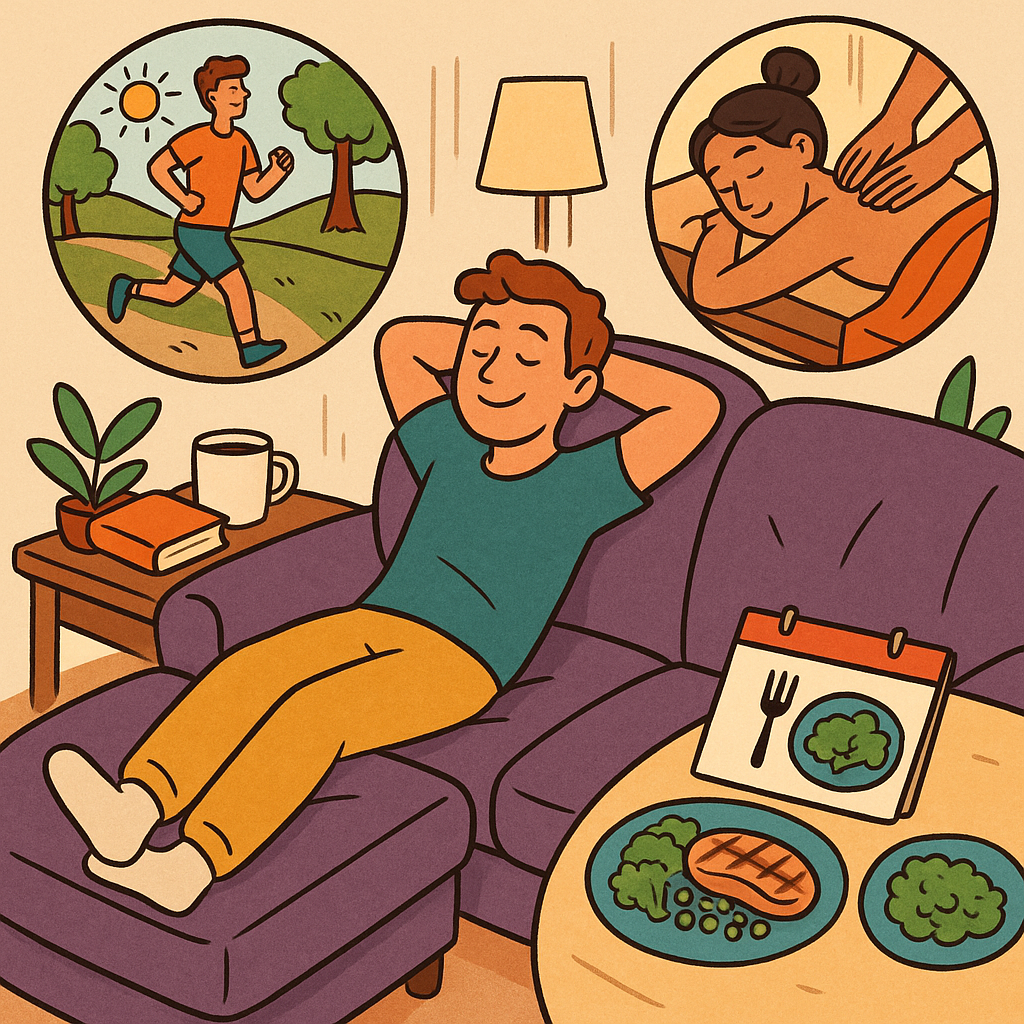Weekend recovery isn’t just a trendy idea—it’s a strategy proven to boost mood, energy, and performance. In this guide, you’ll learn how to craft a recovery‑focused weekend using the latest wellness tech, relaxation tactics, and research to return to Monday refreshed and ready.

Why a recovery‑focused weekend matters
When work drains your energy and focus, the weekend offers a vital chance to reset. Studies from Psychology Today highlight that how you spend weekends—choosing creative or restorative activities based on your job—can directly affect how you feel and perform at the start of the week.
But it’s not just about doing nothing. A meta-analysis on stress recovery defined four key experiences—psychological detachment, relaxation, mastery, control—that reduce stress and boost wellbeing. This guide helps you structure your weekend to check each box.
What’s trending: Recovery tech and weekend wellness
1. High-tech recovery tools
2024 saw recovery tech move from novelty to norm. From cryotherapy and infrared saunas to percussive therapy, recovery lounges are now core features in biohacking studios and gyms. These modalities support inflammation reduction, muscle recovery, and mental reset—perfect for weekend planning.
2. Digital wellness escapes
Luxury “digital detox” retreats are booming. From secluded off-grid resorts to wellness centers deliberately banning screens, the message is clear: disconnect to reconnect.
3. VR forest-bathing experiences
For those who can’t get into nature, VR is stepping in. Early studies show high-fidelity VR forest-bathing reduces stress and boosts cognition similarly to real nature immersion.
Step‑by‑step: Planning a recovery‑focused weekend
Friday evening: Start with intention
- Psychological detachment: Turn off notifications at 6 pm. Let colleagues know you’re offline until Monday morning.
- Relaxation: Begin with light movement—walk around your neighborhood or do a short stretch session.
- Control: Create a rough plan for your weekend—highlights only.
- Mastery: Choose an engaging activity: cooking a new recipe, painting, music.
Saturday: Deep recovery day
- Morning sunlight exposure (10–15 minutes) to reset circadian rhythm.
- Wellness tech session: Drop into a cryotherapy, infrared sauna, red‑light therapy, or hyperbaric treatment.
- Mindful nature break: Walk in the park or use VR forest-bathing for stress relief .
- Nutrition reset: Eat gut-friendly snacks or make a nourishing smoothie.
- Creative challenge: Spend time on a skill or hobby—painting, writing, home projects.
Sunday: Gentle wind‑down
- Active recovery: Go for low-impact movement (yoga, gentle hike) to boost circulation and release tension.
- Digital detox hour: An afternoon session without screens—read, nap, journal.
- Reflect & plan: Quietly review what you did, how you feel, and set gentle intentions for the week.
Top 5 tools for a recovery‑focused weekend
- Cryotherapy or cold plunge – reduces inflammation, speeds muscle recovery.
- Infrared sauna or red‑light therapy – supports relaxation and healing.
- Biofeedback wearables (e.g. Oura, Whoop) – track sleep, recovery readiness, HRV.
- VR forest-bathing apps – immersive stress-relief in minutes.
- Meditation or sleep-enhancing tech – white-noise machines, circadian lighting, guided meditations.
Weekend sample schedule (summary)
| Time | Friday | Saturday | Sunday |
|---|---|---|---|
| 6–10 pm | Shut off work, light movement | Restful tech—sauna, VR, fresh food | Outdoor stretch, detox hour |
| Morning | Light stretch or walk | Sunlight + sauna/cryotherapy | Low-impact movement |
| Afternoon | Social or hobby time | Creative/challenge session | Reflect, digital detachment |
| Evening | Prep for weekend | Chill evening, light meal, no screens | Gentle reflection, calm sleep |
Science snapshot: Why this works
- Activity + detachment + sleep during weekends significantly reduce Monday stress—but only if you truly detach and sleep more than usual.
- Four recovery experiences (detachment, relaxation, control, mastery) are linked to lower stress and higher performance.
- Relaxation on weekends correlates with reduced hostility and fear.
- Outdoor time and sunlight regulate circadian rhythm and support mental wellness.
Tips to maintain momentum
- Habit stacking: Build weekly micro-recovery habits—midweek digital detox, daily sun breaks, evening walks.
- Set boundaries: Block weekend time on your calendar and adhere to it.
- Track your return: Use journals or apps to note mood, energy, focus on Monday; refine next weekend.
Final thoughts
Designing a recovery-focused weekend is no longer optional—it’s essential. By pairing evidence-based strategies with the latest wellness tech and mindful planning, you can build weekends that truly recharge your mind and body. As recovery becomes the core of modern wellness culture, your weekends can be both restorative and empowering.
References
Firstbeat Technologies (2023). How to Design Your Weekend to Boost Recovery for the Working Week. Firstbeat. Retrieved from https://www.firstbeat.com/en/blog/how-to-design-your-weekend-to-boost-recovery-for-the-working-week/
Growthalista (2024). Ultimate Self‑Care Weekend Guide for Burnout Recovery. Growthalista Blog. Retrieved from https://www.growthalista.com/blog/self-care-weekend
Canyon Vista Recovery Center (2020). Have Fun, Stay Sober – Tips for Enjoying the Weekend in Recovery. Canyon Vista. Retrieved from https://canyonvista.com/blog/tips-for-enjoying-weekend-recovery/






